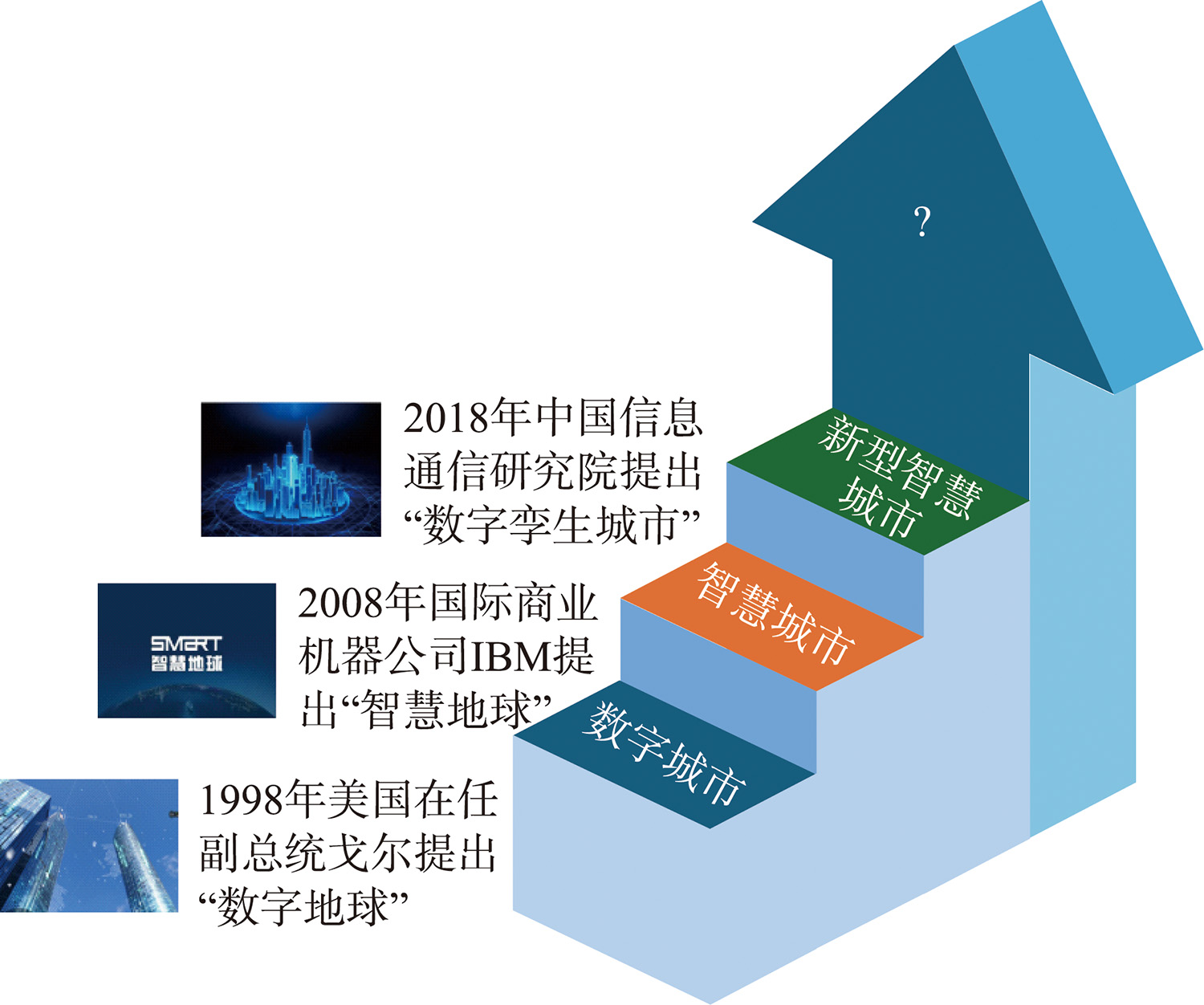

新型智慧城市建设与展望:基于AI的大数据、大模型与大算力
|
张新长(1957— ),男,新疆乌鲁木齐人,博士,教授,国际欧亚科学院院士、俄罗斯工程院外籍院士,主要从事空间数据整合及自适应更新技术方法、数字城市(智慧城市)理论与方法、深度学习与自然资源要素分类和提取等方面的教学与研究工作。E-mail: zhangxc@gzhu.edu.cn |
收稿日期: 2024-01-29
修回日期: 2024-03-07
网络出版日期: 2024-05-11
基金资助
国家自然科学基金面上项目(42071441)
国家自然科学基金面上项目(42371406)
Progress and Prospects of New Smart City Construction: AI-based Big Data, Big Models and Big Computing Power
Received date: 2024-01-29
Revised date: 2024-03-07
Online published: 2024-05-11
Supported by
National Natural Science Foundation of China(42071441)
National Natural Science Foundation of China(42371406)
新型智慧城市是城市数字化向智能化、进一步向智慧化发展的必然要求,是实现高质量发展的重要环节。本文首先介绍了智慧城市的背景和基本概念,分析了数字城市、智慧城市和新型智慧城市3个阶段的关系和区别。数字城市利用计算机网络、空间信息和虚拟现实技术实现城市信息数字化,重在建设信息基础设施。智慧城市则依赖时空大数据、云计算、物联网等技术,旨在整合城市生活的各个系统,重在搭建统一的数字平台以便智能化管理。新型智慧城市结合数字孪生、区块链、元宇宙等技术进行全城整合,并采用基于人工智能的智能生命体进行决策,融合现实与虚拟元素,实现先进的城市管理。本文随后探讨了新型智慧城市的建设,重点关注以技术和社会需求为驱动力的高质量城市发展。它突出了从数字城市到智慧城市的过渡,强调了信息基础设施和智能技术在发展过程中的作用。论文讨论了三维城市建模、数字孪生和元宇宙等关键技术,并详细介绍了它们对城市规划和治理的影响。本文还探讨了智慧城市如何促进经济增长、满足国家需求以及确保公共健康和安全。人工智能、物联网和区块链等技术的融合对于创造互联、高效和可持续的城市环境至关重要。本文最后评估了智慧城市在衡量经济发展方面的作用,展示了其作为国家进步基准的潜力。最后,基于人工智能技术的最新进展,本文分析并系统展望了人工智能在建设新型智慧城市中可以发挥的关键作用。人工智能在分析海量数据、改善决策以及整合各种城市系统的能力,都为实现智慧化城市生态系统的愿景提供了重要支撑。在“人工智能+物联网”、“人工智能+大数据”、“人工智能+大模型 ”和“人工智能+大算力”的协同作用下,新型智慧城市有望实现无与伦比的城市智能化水平,并最终实现可持续、高效和以人为本的高质量城市发展。

张新长 , 华淑贞 , 齐霁 , 阮永俭 . 新型智慧城市建设与展望:基于AI的大数据、大模型与大算力[J]. 地球信息科学学报, 2024 , 26(4) : 779 -789 . DOI: 10.12082/dqxxkx.2024.240065
The new smart city is an inevitable requirement for the development of urban digitalization to intelligence and further to wisdom, and is an important part of achieving high-quality development. This paper first introduces the background and basic concept of smart city, and analyzes the relationship and difference between the three stages of digital city, smart city and new smart city. Digital cities use computer networks, spatial information and virtual reality to digitize urban information, and focus on building information infrastructure. Smart cities, on the other hand, use spatio-temporal big data, cloud computing, and the Internet of Things to integrate systems across urban life, emphasizing intelligent management through a unified digital platform. New smart cities combine technologies such as digital twins, blockchain, and the meta-universe for citywide integration, and employ AI-based intelligent lifeforms for decision-making, blending real and virtual elements for advanced city management. This paper then explores the construction of new smart cities, focusing on high-quality urban development driven by technology and societal needs. It highlights the transition from digital to smart cities, emphasizing the role of information infrastructure and intelligent technology in this evolution. The paper discusses key technologies such as 3D urban modeling, digital twins, and the metaverse, and details their impact on urban planning and governance. It also examines how smart cities contribute to economic growth, meet national needs, and ensure public health and safety. The integration of technologies such as AI, IoT, and blockchain is shown to be critical to creating connected, efficient, and sustainable urban environments. The paper concludes by assessing the role of smart cities in measuring economic development, demonstrating their potential as a benchmark for national progress. Finally, based on the latest advances in AI technology, this paper analyzes and systematically looks forward to the key role AI can play in building new smart cities. AI's ability to analyze massive amounts of data, improve decision-making, and integrate various urban systems all provide important support for realizing the vision of a truly smart city ecosystem. With the synergy of "AI + IoT", "AI + Big Data", "AI + Big Models", and "AI + High Computing Power", the new smart cities are expected to achieve an unparalleled level of urban intelligence and ultimately a high quality of sustainable, efficient, and people-centered urban development.

| [1] |
李德仁. 信息高速公路、空间数据基础设施与数字地球[J]. 测绘学报, 1999, 28(1):1-5.
[
|
| [2] |
段学军, 顾朝林, 甄峰, 等. “数字城市”的概念、框架与应用[J]. 现代城市研究, 2001, 16(3):61-64.
[
|
| [3] |
巫细波, 杨再高. 智慧城市理念与未来城市发展[J]. 城市发展研究, 2010, 17(11):56-60,40.
[
|
| [4] |
于文轩, 许成委. 中国智慧城市建设的技术理性与政治理性——基于147个城市的实证分析[J]. 公共管理学报, 2016, 13(4):127-138,159-160.
[
|
| [5] |
赵建海, 屈小爽. 我国新型智慧城市评价指标体系构建与发展建议[J]. 未来城市设计与运营, 2022(8):16-19.
[
|
| [6] |
李德仁. 数字孪生城市智慧城市建设的新高度[J]. 中国勘察设计, 2020(10):13-14.
[
|
| [7] |
向玉琼, 谢新水. 数字孪生城市治理:变革、困境与对策[J]. 电子政务, 2021(10):69-80.
[
|
| [8] |
张新长, 廖曦, 阮永俭. 智慧城市建设中的数字孪生与元宇宙探讨[J]. 测绘通报, 2023(1):1-7,13.
[
|
| [9] |
唐斯斯, 张延强, 单志广, 等. 我国新型智慧城市发展现状、形势与政策建议[J]. 电子政务, 2020(4):70-80.
[
|
| [10] |
谭梦琪. “十四五”全国城市基础设施建设规划出炉[J]. 中国勘察设计, 2022(8):5.
[
|
| [11] |
王家耀. 大数据时代的智慧城市[J]. 测绘科学, 2014, 39(5):3-7.
[
|
| [12] |
张新长, 李少英, 周启鸣, 等. 建设数字孪生城市的逻辑与创新思考[J]. 测绘科学, 2021, 46(3):147-152,168.
[
|
| [13] |
张茜, 任超, 霍文虎. 全景真三维技术在城市规划建设中的研究与应用[J]. 测绘与空间地理信息, 2018, 41(4):135-137.
[
|
| [14] |
贺异欣, 张新长, 吴福成, 等. 实景三维下的AIGC变形监测算法分析[J]. 测绘科学, 2023, 48(11):211-217.
[
|
| [15] |
朱庆. 三维GIS及其在智慧城市中的应用[J]. 地球信息科学学报, 2014, 16(2):151-157.
[
|
| [16] |
龚俊, 朱庆, 眭海刚, 等. 从CAD模型到数码城市GIS模型的若干问题[J]. 武汉大学学报(工学版), 2003, 36(3):64-68.
[
|
| [17] |
纪博雅, 戚振强. 国内BIM技术研究现状[J]. 科技管理研究, 2015, 35(6):184-190.
[
|
| [18] |
卫校飞. 智慧城市的支撑技术——建筑信息模型(BIM)[J]. 智能建筑与城市信息, 2013(1):96-100.
[
|
| [19] |
包胜, 杨淏钦, 欧阳笛帆. 基于城市信息模型的新型智慧城市管理平台[J]. 城市发展研究, 2018, 25(11):50-57,72.
[
|
| [20] |
吴志强, 甘惟, 臧伟, 等. 城市智能模型(CIM)的概念及发展[J]. 城市规划, 2021, 45(4):106-113,118
[
|
| [21] |
周瑜, 刘春成. 雄安新区建设数字孪生城市的逻辑与创新[J]. 城市发展研究, 2018, 25(10):60-67.
[
|
| [22] |
翟云, 程主, 何哲, 等. 统筹推进数字中国建设全面引领数智新时代——《数字中国建设整体布局规划》笔谈[J]. 电子政务, 2023(6):2-22.
[
|
| [23] |
彭国超, 吴思远. 元宇宙:城市智慧治理场景探索的新途径[J]. 图书馆论坛, 2023, 43(3):86-92.
[
|
| [24] |
蒋明, 李琪, 龚才春, 等. 元宇宙技术及应用研究进展[J]. 广西科学, 2023, 30(1):14-26.
[
|
| [25] |
郭全中, 杨元昭. 回调、 蓄力:元宇宙发展现状、困境与趋势分析[J]. 新闻爱好者, 2023(6):9-15.
[
|
| [26] |
姚俊华. 基于物联网和生态系统的智慧城市可持续设计研究[J]. 科技资讯, 2023, 21(21):253-256.
[
|
| [27] |
李德仁, 姚远, 邵振峰. 智慧城市中的大数据[J]. 武汉大学学报(信息科学版), 2014, 39(6):631-640.
[
|
| [28] |
王静远, 李超, 熊璋, 等. 以数据为中心的智慧城市研究综述[J]. 计算机研究与发展, 2014, 51(2):237-259.
[
|
| [29] |
李辉. 大数据推动我国经济高质量发展的理论机理、实践基础与政策选择[J]. 经济学家, 2019(3):52-59.
[
|
| [30] |
|
| [31] |
董正浩. AI大模型在智慧城市领域的应用与前景[J]. 通信世界, 2023(17):39-40.
[
|
| [32] |
王霞, 张海剑. 人工智能技术赋能城建档案高质量发展[J]. 未来城市设计与运营, 2023(12):77-80.
[
|
| [33] |
OpenAI. Video generation models as world simulators[EB/OL]. [2024-2-15].
|
| [34] |
林焕富, 覃江荣, 陈帮泰. 打造基层治理重器,让城市更聪明更智慧——深圳龙岗城市大脑实践[J]. 中国建设信息化, 2021(6):28-33.
[
|
| [35] |
|
| [36] |
|
/
| 〈 |
|
〉 |